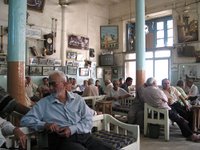
The news that a street of bookshops is now practically deserted hardly seems to figure in the scheme of things when a city is torn by daily sectarian violence and an ever mounting death toll. But this story made me feel very sad.
Al-Mutanabbi Street, named for an Iraqi poet was once the centre of Baghdad's intellectual and literary life.
Yassin Al-Rubai'i reports on the website of the
Institute for War and Peace Reporting:
For many years, Friday was the day Iraq’s intellectuals and lovers of literature would descend on Al-Mutanabbi Street, in the historic heart of Baghdad. From morning ‘till early afternoon, the small alley, home to the oldest bookstores in town, turned into a crowded open-air book fair.
The pavement on both sides was covered with well-thumbed titles from around the globe - in Arabic, English, German, Farsi and other languages - along with dictionaries, science texts, light and heavy novels alike. For more precious or - in Saddam’s times - forbidden books, customers would follow dealers into their labyrinthine stores in one of the adjacent courtyards, usually stacked to the ceiling with antiquarian tomes.
The oldest store on the street, the Al-Arabia Bookshop, was opened in 1904, at a time when Baghdad’s appetite for literature was particularly keen. “What is written in Cairo and published in Beirut, is read in Baghdad,” an old saying goes.
But with the violence and the Friday curfew which followed the customers stopped coming and many of the booksellers were forced to sell out.

Also forced to closed was the Shabander teahouse at the end of the street was the place where poets, writers and artists would meet over sweet tea and a hubble-bubble pipe. A place known for intellectual resistance to the regime and a center for liberal ideas:
Today, the street where books and writers coexist has become a street of ghosts. ... Iraqis still shop in the book district, but most of the intellectuals who felt free to say what they thought in public are either in hiding or have fallen silent out of fear that spies for various armed groups will target them for assassination. Iraqi writers are starting to head underground, retreating to protected offices. Because literary culture is so bound to a particular neighborhood of Baghdad, an attack on Al Mutanabbi Street is an attack on Iraqi culture itself. This is a culture once so vibrant that a famous slogan in the Arab world ran, "Cairo writes, Beirut publishes, Baghdad reads."
writes Philip Robertson in an excellent article about the effect of the war on Baghdad's intellectuals and writers on
salon.com. Do read.
(Pic at top nicked from Iraq Blog Count, pic of Shabandar tea house from saloon.com)
 Before and after in the bookmarket in Al-Mutanabi Street the literary and cultural heart of Baghdad. The car bomb that ripped through the area left at least 26 dead and wounded 65.
Before and after in the bookmarket in Al-Mutanabi Street the literary and cultural heart of Baghdad. The car bomb that ripped through the area left at least 26 dead and wounded 65.

